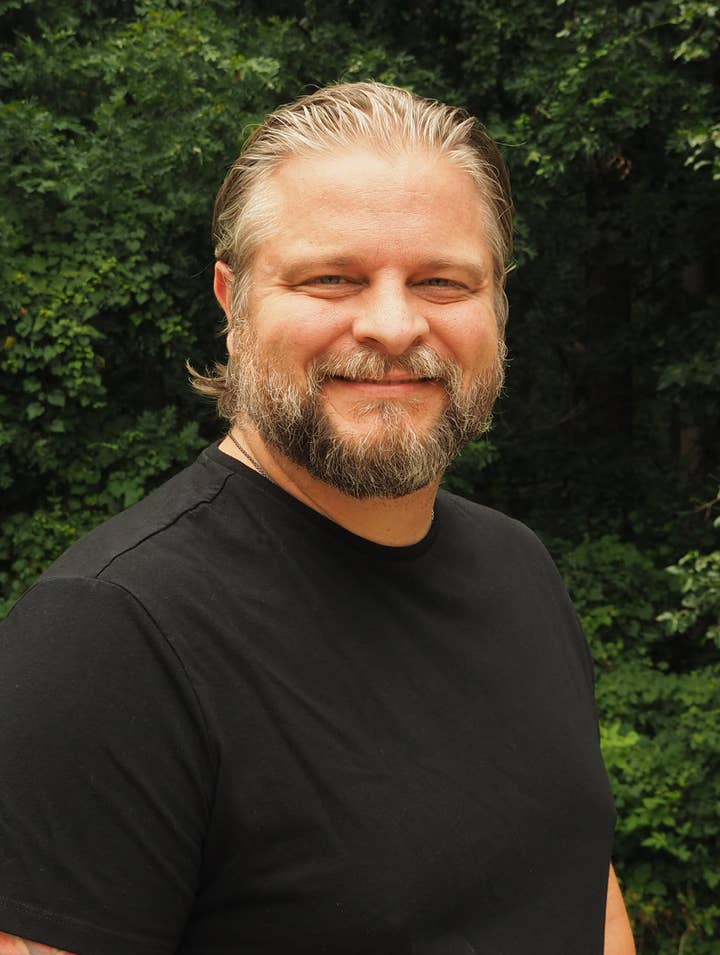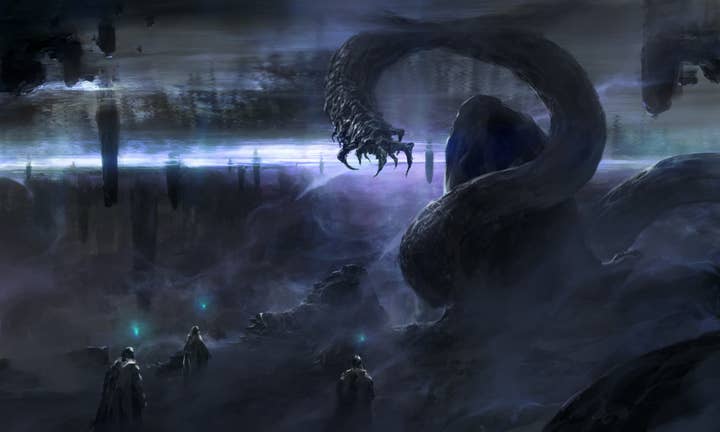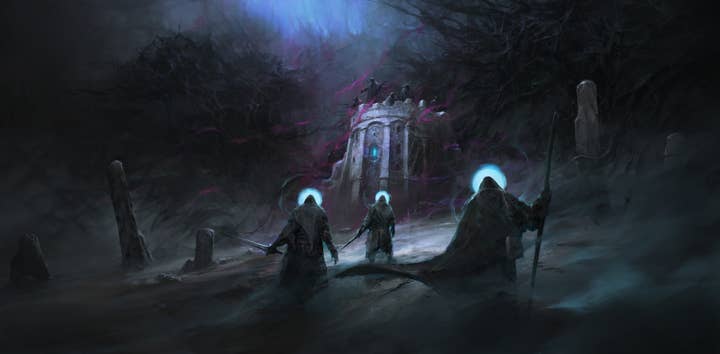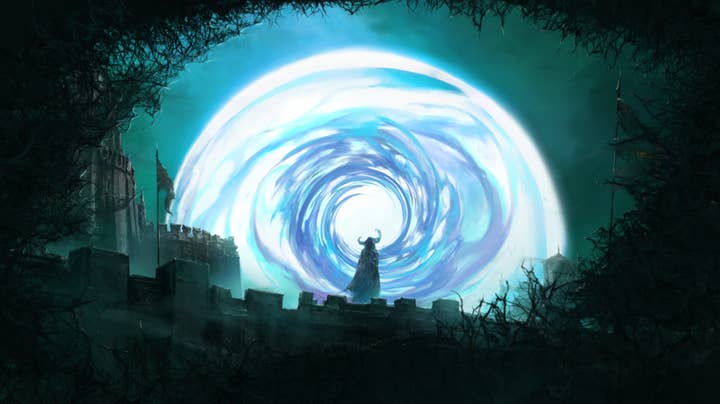Ex-Bethesda vet forms Something Wicked
Jeff Gardiner talks about his studio's plan to build an open-world RPG, keeping the scope manageable, and what happened with Fallout 76
Today's Gamescom Opening Night Live event featured the first teaser trailer for Wyrdsong, the debut title from Something Wicked Games.
Something Wicked is the product of founder and CEO Jeff Gardiner, a former Bethesda developer who worked on The Elder Scrolls Oblivion and Skyrim, as well as Fallout 3, 4 before serving as project lead on Fallout 76.
In keeping with his professional experience, Gardiner tells GamesIndustry.biz that Wyrdsong will be a "dark, preternatural historical fantasy open-world RPG set in middle-ages Portugal."

"It gives the player an opportunity to question their reality as they proceed through this environment," Gardiner says. "We're basing it in Portugal around the time of the Knights Templar in order to introduce some esoteric and maybe occult elements to the game. Ultimately, you can be whatever gender or race you want and explore this land and this idea that the brain is not a passive receptor of information, and RPGs too, like most modern film and books, can have unreliable narrators."
Gardiner left Bethesda about a year ago to explore some career possibilities including going to work at other studios or consulting, but ultimately decided to go the start-up route and find outside funding for a new company.
"Netease came in very strong and very early and gave us a $13.2 million seed round with no real milestones or timelines associated with that," Gardiner says. "They understand that a creative process is something that should be managed internally. We're very big on setting our own goals and milestones; that worked very well for us at Bethesda and we plan on continuing that with Something Wicked Games."
Something Wicked has about 15 people to date (a few of which are contractors) and Gardiner is expecting to grow the team to about 65 or 70 people.

"We shipped Fallout 3 with around the same amount of people and Skyrim with about 100, so I am very convinced we can come up with a game that will satisfy the open RPG itch with a narrow subset of people," Gardiner says.
If that sounds small for a AAA RPG, Gardiner notes a few factors he believes should help make it doable. For one, the company is using Unreal Engine 5 rather than building its own engine from scratch. Second, the backing of Netease leaves open the possibility for assistance when it comes to art asset creation or other outsourceable tasks. And while a smaller team may be more economical, Gardiner says that's not the main motivation in keeping the headcount contained.
"I find that when studios get too large sometimes people get lost in the shuffle and it really hurts creativity when people are just there checking boxes"
"The main reason I'm doing that is I want everyone on the project to really feel ownership and be able to put their stamp on it. I find that when studios get too large sometimes people get lost in the shuffle and it really hurts creativity when people are just there checking boxes," he says.
An open-world AAA RPG is still a high bar to set, which Gardiner should be keenly aware of given the expectations Bethesda's past products have set in that arena. So how does he plan to meet player expectations with a smaller team building a world and gameplay systems from the ground up?
"I've spent 15 years in production so I'm very well aware of the limits of what a team can do based on their size and budget," Gardiner says. "We plan on scoping this game realistically within those in order to succeed in our goal, which is to get this out and then expand upon it in the future.
"The idea in a modern gaming environment that games are fire-and-forget can be a sort of mistake. Some people can do this, don't get me wrong. But I look forward to the ability to put a game out that's very extensible, to support it through the future and put more and more content in as players come in and enjoy it."
We ask if that then suggests something closer to a games-as-a-service approach with constant updates rather than the core game plus sporadic DLC/expansions offerings that have been more common in the genre.
"I am not naïve to the fact that this game has to turn a profit at some point and be successful," Gardiner says. "We have some early ideas of how we want to go about long-term supporting this game and the development staff, but it's probably too early to paint particular details there, especially because sometimes those get weaponized, frankly.
"For me, personally the number one priority is to put out an unbelievably great game that is compelling enough for fans to keep coming back out and as a result of that, we'll be able to monetize from there. The biggest multiplier on any monetization scheme is the number of users, so that's my goal."

As for inspirations, Gardiner said he was encouraged by the success of From Software's Elden Ring, which launched in February and sold so well it seemed to suck up all the oxygen in the industry.
"I think [From Software is] amazingly successful at letting a player figure things out on their own, not hand-holding them, and letting the player feel that sense of discovery and experimentation, even though it's sometimes maybe frustrating because you go into a zone that's too hard for you or you get one-shotted by the boss right outside the tutorial level exit. At the same time, the player learns very quickly to avoid those encounters and they're just learning experiences. And it sets them up for an unbelievable feeling of success later when they kick that's knight's ass who was wandering around outside the starting area."
He adds: "I love that open-world RPGs can still do that and have that level of success despite maybe not being the most gamer-friendly games on the market."
When we speak, it is not long after Embracer Group announced yet another round of acquisitions. Considering Gardiner left Bethesda shortly after Microsoft acquired it, we ask him for his thoughts on the trend of consolidation in the industry.
"If they're done properly and with good intent, a game studio being acquired can be a positive," Gardiner says. "Obviously, history is littered with failure there… Microsoft has had a great approach to that. I wasn't there very long, but they were just like, 'Keep doing what you're doing.'
There are a lot of veterans taking this opportunity to start their own studios and live this dream of creating something that is maybe a little more risky...
"It is a very interesting time because it also results in the Something Wicked Games of the world. There are a lot of veterans taking this opportunity to start their own studios and live this dream of creating something that is maybe a little more risky or a little more edgy that a larger organization can't really do because of the amount of money they've invested. They have to be a little more cautious.
"All I can do is look at what happened in other industries and there are examples of it being really not good in the music industry, and sort of a net positive with film and television, in particular. Television is in an unbelievable heyday now and it's funny. When all these other streaming services started popping up, I got frustrated as a consumer because now I had to subscribe to hundreds of things. But at the same time, the resulting content has been amazing. I think there are opportunities there for content creators, even though there is obviously a fear that it would go the music streaming service way where people are getting paid fractions of pennies on a song."
To date, Something Wicked has done most of its recruiting through Gardiner's professional circles. We note that veteran developers' circles are often populated by other veteran developers with experience in the industry dating back decades, which winds up being a less-than-diverse talent pool from which to pull a founding team, something other start-up studios have had issues with in the past.
"We are very aware of the lack of diversity in this industry in the last 20 years, and we want to not continue that trend in any way," Gardiner says. "So it has been my top priority in recruiting to bring people into leadership roles that are diverse, both culturally, racially, and in their gender orientation. [It's] absolutely one of my top priorities, and you have to do more than just give lip service to that. You have to make it a priority, including giving people opportunities to advance in their career, to be successful in those roles, because a lot of them started their careers later because of the problems we've had in this industry."
Finally, we ask about a recent Kotaku report on the development of Fallout 76 alleging crunch and mismanagement, particular in regards to the QA team. Given Gardiner's role as project lead, we ask what happened with the project, and what he is doing to ensure Something Wicked and Wyrdsong won't produce similar stories.
"The experience of the anonymous people who reported in the Kotaku article, I cannot confirm or deny," Gardiner says. "All I can do is talk about my experience at Bethesda, where I was not subject to that kind of crunch, nor was I personally perpetuating that on others.
"Something Wicked Games is definitely going to be a crunch-free environment. For years and years in this industry, we've read whitepapers and seen the effects first-hand and through studies of how terrible [crunch] is. Creativity is not a faucet you turn on and off. It's not something you can force out of people, it's not something long hours produces. What you have to do is give people operational independence and creative autonomy to be successful, and set results-oriented goals. That's what we're going to do at Something Wicked Games.
"We're very concerned with employees' wellbeing because a happy, successful employee is going to make a great game. The opposite is never true."









